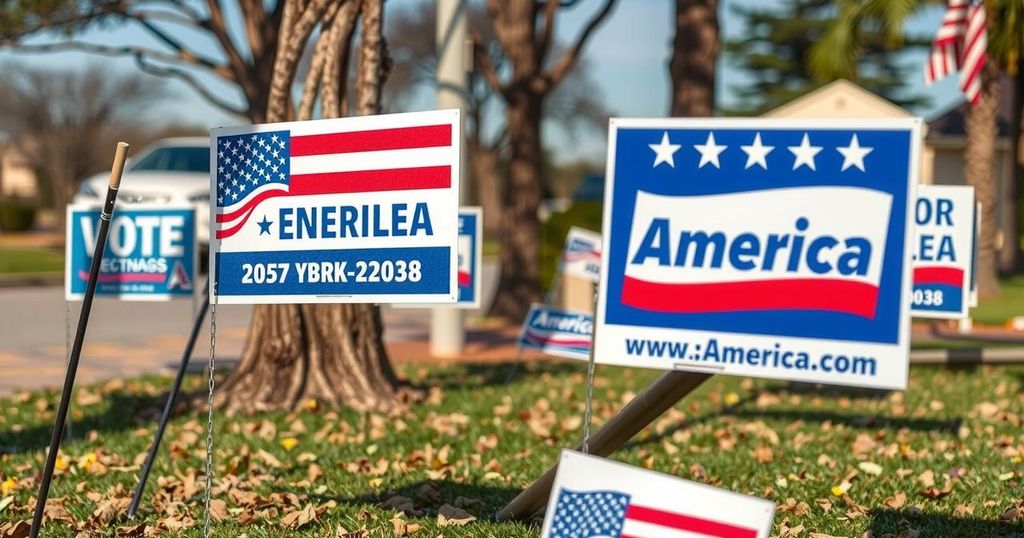Through My Lens: The Cultural Significance of American Election Yard Signs

The article discusses the author’s experiences as a newcomer to the U.S. during election seasons, focusing on the cultural significance of yard signs in expressing political support. The author reflects on the differences between American elections and those in other countries and emphasizes the importance of accessible civic engagement. The yard signs symbolize a personal journey from observation to active participation in democracy.
As a recent immigrant to the United States, particularly in the state of Maine, I find myself captivated by the intricacies of the American electoral season. This marks my second presidential election, and I have begun to reflect on the profound differences between the electoral process here and that of other countries I have experienced. Voting for the first time in 2020 amidst the race between Donald Trump and Joe Biden was a whirlwind filled with both stress and elation. With another election upon us, I am once again engulfed in the anticipation of the results while simultaneously reveling in the invigorating experience of casting my vote. One aspect of American elections that has particularly caught my attention is the prevalent culture of yard signs. Commencing my observations in Maine, the signs have become a ubiquitous presence in neighborhoods and along rural roads, akin to vibrant blooms in the spring as the election season approaches. They have served as a valuable tool for me to familiarize myself with local candidates across various offices, from school boards to Congress. Additionally, these signs display the political preferences of my neighbors, some of whom proudly showcase their support for particular presidential candidates or political parties. This year, I have taken part in this cherished American custom, adorning my yard with a Harris-Walz sign while my neighbors have chosen to display a Trump-Vance sign. There is an unexpected joy in traversing the streets and counting the signs, transforming it into a delightful game. This method of declaring political support serves as an unassuming yet bold indication of personal stance, a practice I had not encountered in previous electoral experiences abroad. While residing in Nairobi, Kenya during a presidential election, I witnessed an entirely different approach; there were no yard signs. Instead, large billboards and banners featuring candidates’ images occupied public spaces and transportation hubs. These portrayals were polished yet lacked the personal touch that is characteristic of American yard signs. Here, they symbolize a citizen’s identity and serve as a visual proclamation of support: “I believe in this candidate, and I want you to know.” What resonates profoundly with me is the informal and accessible nature of this practice. In the United States, a citizen does not need to belong to a political elite to voice their opinion; a simple yard sign can be as powerful as a grand campaign rally. This conveys a vital message: every voice is significant, and wealth or influence is not a prerequisite for asserting one’s views regarding the future of one’s community or country. For me, these signs transcend mere political advertisements; they represent the essence of democracy—a tangible reminder of the rights I have diligently acquired as a new citizen. In numerous regions of the world, elections can evoke trepidation and tension; however, here, amidst the stress and anxiety surrounding elections, there exists a palpable sense of liberty, empowerment, and pride. I find myself fully integrated into a system that permits not only my vote but also the ability to broadcast my opinions through something as humble as a yard sign. Though U.S. election seasons can be prolonged and fraught with intensity, the build-up of excitement, anticipation, and stress embodies a uniquely American experience. It reflects a culture that encourages public engagement, dialogue, and debate. I find it encouraging that this nation has cultivated an environment conducive to such overt civic participation. As I approach my second presidential election, I carry forward the insights gained from my inaugural experience: patience, hope, and the affirmation that my vote holds significance. While the yard sign in my front yard may appear modest, it symbolizes my personal journey—from a spectator to an active participant in the democratic process. This, indeed, is a remarkable transformation.
The article reflects the author’s experiences as a newcomer to the United States, observing the cultural nuances surrounding American elections, particularly the use of yard signs to express political affiliations. It compares this practice to electoral traditions in other countries, highlighting the accessibility and informality of civic engagement in America. The reflections draw on the author’s personal journey from a foreign observer to an engaged citizen, emphasizing the importance of political expression and participation in a democracy.
In summary, the author illustrates the significance of yard signs in the American electoral process, highlighting their role as symbols of civic engagement and personal political identity. This practice stands in stark contrast to electoral customs observed in other nations, emphasizing the accessibility and empowerment inherent in the American democracy. As the author prepares for their second presidential election, they recognize the importance of their participation and the symbolic power of a simple yard sign as a testament to their journey as a new citizen.
Original Source: www.pressherald.com







